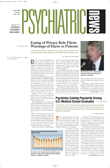Anybody who has experienced jet lag knows that it can be a real downer, leading to fatigue, grouchiness, or simply being out of sorts. But for persons with psychiatric illness, jet lag may pose an extra threat as well: reactivation of their mental illness.
This study finding comes from Gregory Katz, M.D., and colleagues of the Kfar Shaul Mental Health Center in Jerusalem, Israel, and is reported in the January-February issue of Comprehensive Psychiatry.
The Kfar Shaul Mental Health Center is unique in that nearly all international visitors to Jerusalem who experience psychiatric emergencies are sent there. Also, nearly all those visitors arrived in Israel by air. Thus Katz and his colleagues decided that their patient population was such that it would allow them to explore scientifically a question that has been scarcely probed up to now: Is there any link between jet lag and psychiatric illness?
From 1993 to 1998, Katz and his team asked 152 foreigners admitted to the Kfar Shaul Mental Health Center—all of whom had arrived in Israel by air—whether they would be willing to participate in a scientific study exploring any putative links between jet lag and psychiatric illness. All agreed.
Katz and his colleagues collected demographic and psychiatric data on the 152 subjects. The demographic data included sex, age, marital status, level of religious involvement, and reason for visiting Jerusalem. The psychiatric data included diagnoses according to DSM-IV criteria and psychiatric histories.
Katz and his coworkers divided the subjects into two groups based on the number of time zones that they had crossed during their flight to Israel. The first group, composed of 81 subjects, had crossed seven or more time zones—that is, they had come from North or South America, the Far East, or Australia. The second group, composed of 71 subjects, had crossed three or fewer time zones—that is, they had come from European countries.
Katz and his team compared the two groups on demographics, psychiatric diagnoses, and direction of flight in coming to Israel. They found that the two groups were not significantly different as far as these factors were concerned. For instance, 54 percent of the first group had schizophrenia, whereas 61 percent of the second group did; 12 percent of the first group had bipolar disorder, whereas 15 percent of the second group did; 2 percent of the first group had pre-existing depression, whereas 5 percent of the second group did. The flight direction had been eastbound for 89 percent of the first group and 86 percent of the second group.
Thus, Katz and his colleagues concluded that since the two groups were not significantly different on such factors, they could be compared for a possible jet-lag effect on psychiatric illness.
So they compared the first group with the second group to see whether there was any significant difference between them regarding the appearance of a new psychiatric disorder. There was not, they found. They then compared the two groups regarding a relapse in existing psychiatric disorders. There was a significantly greater number of relapses in the group that had flown across seven time zones than in the group that had flown across only three, they discovered.
“The results of our study,” they concluded in their study report, “indicate a connection between relapse of existing psychotic or affective disorders and jet lag.”
David Neubauer, M.D., an assistant professor of psychiatry at Johns Hopkins University in Baltimore, has a special interest in jet lag and psychiatry. He told Psychiatric News that he thinks that this study “is fascinating, a very clever idea! . . . It highlights the potential problems that can occur from jet lag. . . . There are a lot of symptoms that we are all familiar with from jet lag, but for those people with psychiatric illnesses, there may be extra vulnerability that goes along with jet lag.”
Neubauer said, however, that he tends to disagree with the researchers over why jet lag may be able to worsen psychiatric illnesses. The investigators hypothesize in their report that it may be because of a disturbance in circadian rhythms due to time-zone changes. Neubauer is more apt to believe that it is because of the sleep deprivation that often accompanies long plane trips regardless of whether one changes time zones. The reason? Sleep deprivation has already been known to enhance mania in persons with bipolar disorder.
“They didn’t have enough cases to really demonstrate the relationship between sleep loss and psychiatric illness,” he said. “But clearly one of the most common things that is seen with jet lag, particularly with eastward travel, is sleep loss.” ▪
